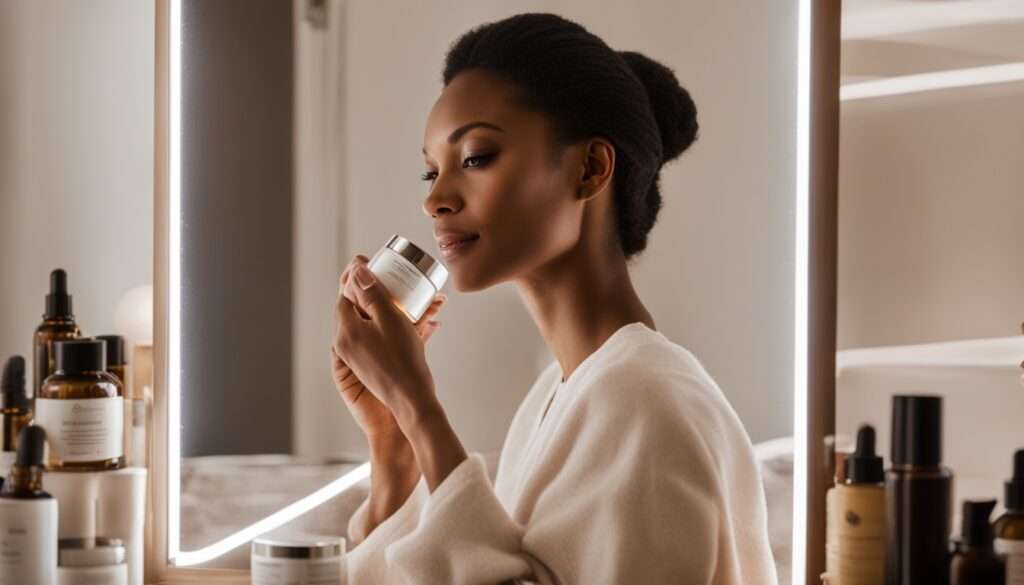Retinol can do marvels for your skin. It’s recognized throughout the globe for minimizing wrinkles and making skin smoother. Adding retinol to your skincare strategy can actually alter your look.
Let’s explore the science of retinol and exactly how it helps your skin. It boosts collagen and enhances your skin’s feel and look. We’ll reveal you many advantages regarding utilizing retinol in your skincare.
We’ll share clever methods to utilize retinol and deal with acne or dark spots. If you’re worried concerning negative effects, do not stress. We have ideas to keep your skin happy and safe from the sun.
Plus, we’ll help you pick the best retinol products for you. After reading, you’ll understand why retinol is great for dynamic, young skin.
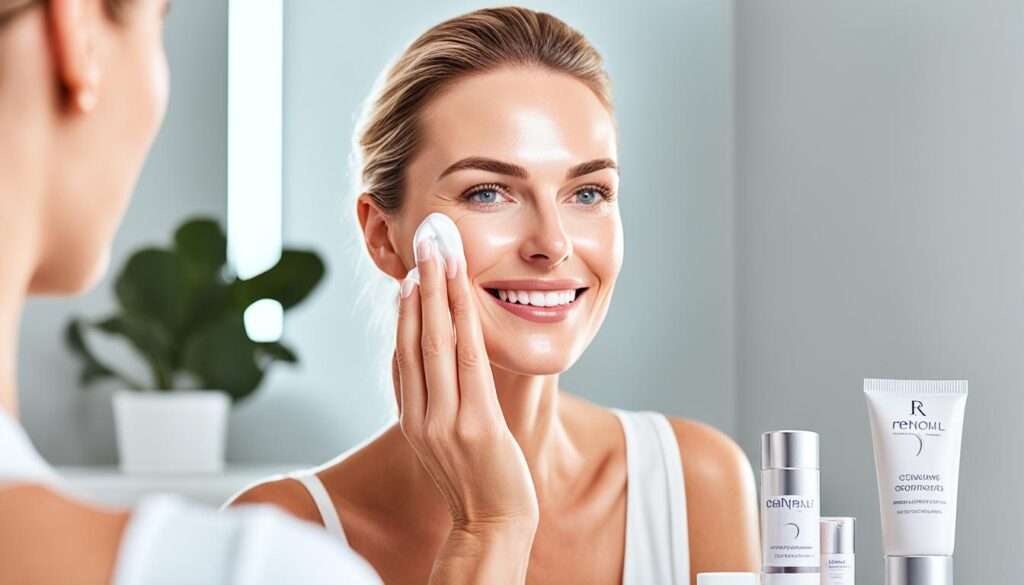
Key Takeaways:
- Retinol offers amazing benefits for your skincare routine, from reducing signs of aging to improving skin texture and tone.
- Understanding the science behind retinol is crucial for unlocking its transformative effects on the skin.
- Retinol is highly effective in addressing specific skincare concerns such as acne and hyperpigmentation.
- Proper incorporation of retinol and precautions can help mitigate potential side effects and protect your skin from sun sensitivity.
- Choosing the right retinol product and concentration is key to personalizing your skincare experience and achieving optimal results.
The Indispensable Introduction to Retinol and Its Skincare Prominence
This section is all about retinol and why it’s a big deal in skincare. Retinol comes from vitamin A and it’s well-known for making skin look better. If you know how retinol works, you can make your skin better by using it.
Retinol is now a must-have in many skincare routines. It boosts collagen, which helps keep skin firm and elastic. This brings a younger, smoother look by reducing wrinkles and lines.
But, retinol does more than fight aging. It improves skin’s overall health by making it smoother and less rough. It lessens pores, evens out skin, and fights acne and dark spots.
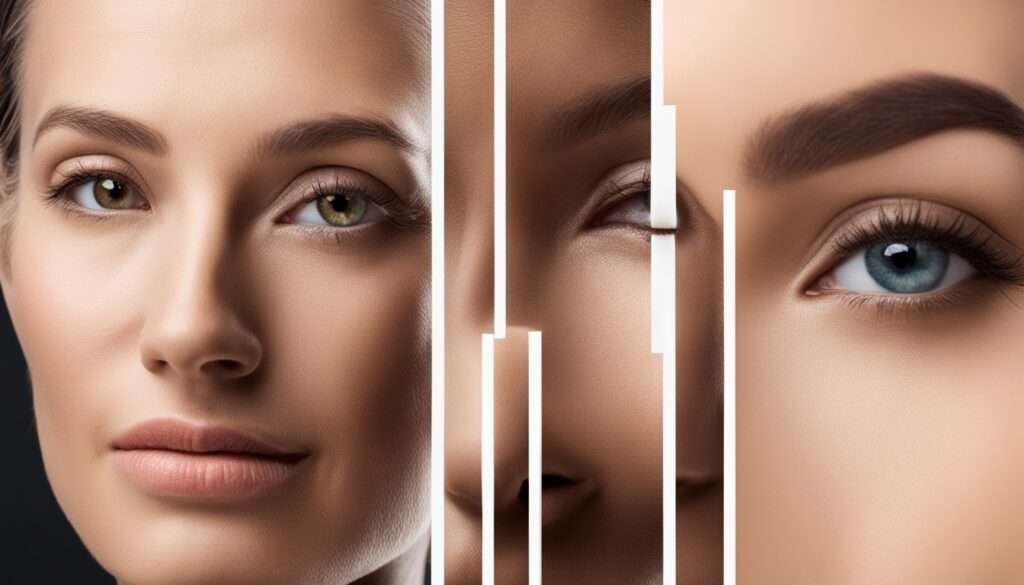
Using retinol in your daily skincare brings many good things for your skin. To get the most out of retinol and avoid any negative effects, use it the right way. In the next part, we’ll explain the science behind retinol, share skin benefits, and give use tips. So, let’s start our journey to better skin with retinol.
What is Retinol and How Does it Transform Your Skin?
Let’s understand what retinol is and how it helps your skin. Retinol’s effects are all about its biology. We’ll explain how it changes the skin and makes it better. This includes things like speeding up cell renewal and making more collagen.
Retinol also benefits different skin issues like acne and signs of aging. You’ll learn why it’s a key part of many skincare routines. Exploring the science can show you why it’s so powerful for healthier skin.
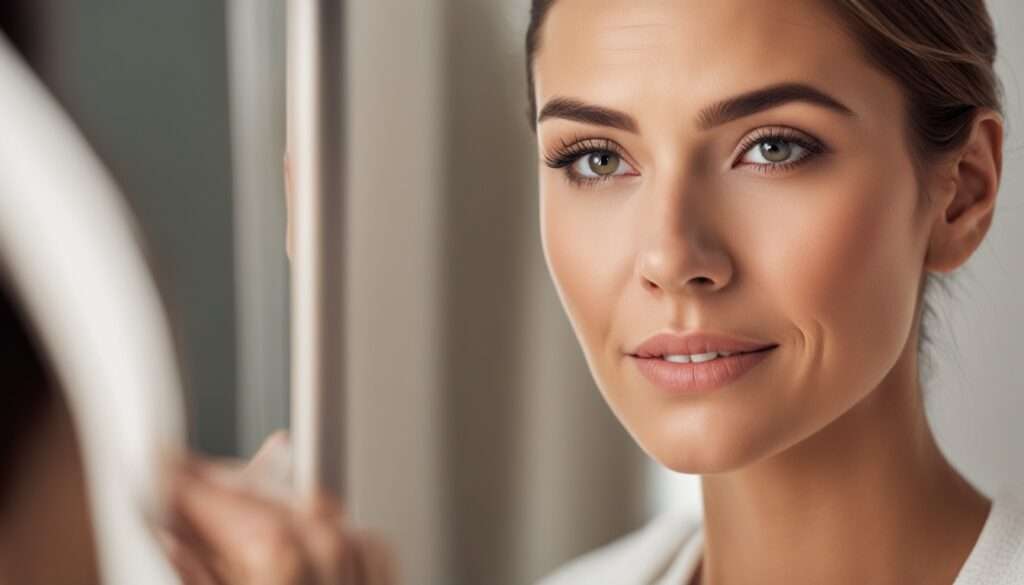
Unlocking the Science of Retinol
Retinol comes from vitamin A and does wonders for your skin. By binding with skin receptors, it makes your skin renew faster. This leads to fresher, smoother skin that looks better.
Retinol Effects on Skin: A Deeper Look
The skin benefits of retinol are well studied. It boosts collagen, which makes your skin plumper and less wrinkled. Your skin becomes more elastic and lively-looking.
It also keeps oil in check, possibly decreasing acne. Retinol clears out your pores and helps skin shed dead cells. Some studies even say it can make brown spots and pigmentation fade for a more even skin tone.
Adding retinol to your routine can help in many ways. It’s a flexible item, fitting into different skin needs and types. Whether your skin shows signs of aging, gets acne, or has uneven color, retinol could be the missing piece for better skin health and looks.
| Advantages of Retinol |
|---|
| Reduces the appearance of wrinkles and fine lines |
| Improves skin texture and tone |
| Regulates oil production and unclogs pores |
| Fades hyperpigmentation and dark spots |
| Promotes collagen production and skin elasticity |
Benefits of using retinol in my skincare routine
Adding retinol to your skincare can do wonders. It tackles aging signs, improves skin’s health and youth. Issues like wrinkles, acne, and uneven skin tone are no match for retinol.
Retinol Advantages for Skin Health and Rejuvenation
Retinol is a game-changer for fighting aging. It boosts collagen, lessening wrinkles and fine lines. So, you get skin that looks and feels younger.
If acne is your concern, retinol can help. It opens clogged pores, cuts down inflammation, and speeds up cell renewal. This leads to clearer, more vibrant skin. It also lightens dark spots, evening out your tone.
In all, retinol makes your skin smoother, brighter, and firmer. It’s the key to a healthy, youthful glow.
Read Also : Clear Skin Complexion: Key Ingredients for Radiant Glow.
Combatting Aging: Retinol Benefits for Aging Skin
Retinol is unbeatable against aging signs. It’s your go-to for lessening wrinkles, fine lines, and age spots.
By quickening cell turnover and boosting collagen, retinol erases wrinkles and lines. It also fades dark spots, uplifting your skin tone. You’ll look younger and more radiant with regular use.
Stick with retinol, and you’ll see big changes in your skin’s age signs. A consistent routine will help you keep that youthful look.
| Benefits of Retinol | Description |
|---|---|
| Reduces wrinkles and fine lines | Retinol stimulates collagen production, leading to smoother and plumper skin, minimizing the appearance of wrinkles and fine lines. |
| Improves acne-prone skin | Retinol helps unclog pores, reduce inflammation, and regulate oil production, effectively treating and preventing acne breakouts. |
| Brightens hyperpigmentation | By promoting cell turnover, retinol helps fade hyperpigmentation, resulting in a more even skin tone and brighter complexion. |
| Enhances skin texture and tone | Regular use of retinol can improve skin texture, minimize pore size, and promote a smoother overall complexion. |
| Boosts skin elasticity | Retinol helps improve skin’s firmness and elasticity, giving your skin a more youthful and supple appearance. |
Retinol Skincare Tips: How to Properly Incorporate Retinol into Your Routine
Retinol does wonders for your skin health. But adding it the right way to your routine matters a lot. Here, I’ll share key tips for using retinol well. They help get the most from it while keeping skin calm.
1. Start with a low concentration:
First off, begin with a little retinol and slowly step it up. This method helps your skin get used to it. It cuts the chance of irritation, too.
2. Use retinol products at night:
Retinol doesn’t like the sun. It loses its power when exposed to sunlight. So, topicals with retinol are meant for nights.
3. Follow up with sunscreen during the day:
When you use retinol, sun protection is a must during the day. Wearing sunscreen is key. Use one that’s SPF 30 or higher. This guards your skin against harm from the sun.
4. Layer retinol with other skincare products:
Mix retinol in with your usual skincare steps. After you cleanse and tone, apply retinol. Then, layer on moisturizer and any other skincare you use. This cuts down on any skin dryness or irritation.
5. Start with a retinol cream or serum:
You’ll find retinol in creams and serums. Pick what works best for you and your skin type. If your skin is on the dry side, a cream could be a better fit. But if it’s more oily or combo, try a serum.
Using these retinol tips will help you see great skin results. Stick with it and be patient. It can take some time for your skin to really show improvements.
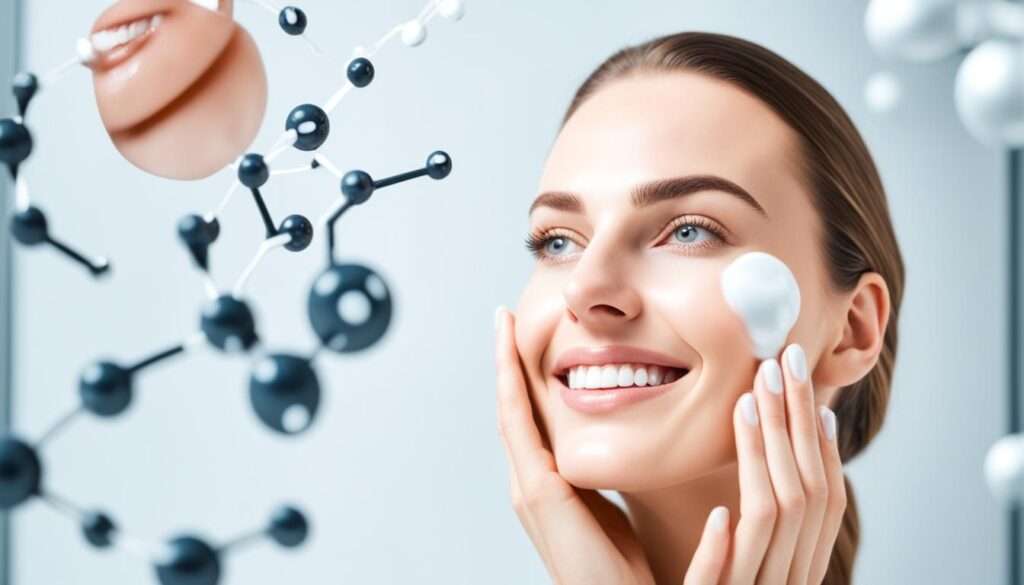
Retinol for Acne: An Unexpected Ally in Blemish Control
Retinol isn’t just for fighting wrinkles. It’s also great for helping with acne. We’ll dive into how retinol can be your friend if you deal with breakouts. Learning about its benefits can make retinol your secret weapon against blemishes.
Retinol Benefits for Acne Prone Skin: Clearing Up Misconceptions
Some think using retinol may make acne worse or skin oilier. But, these ideas are wrong. Retinol is good for acne because it clears out pores, controls oil, and fights the bacteria that cause spots.
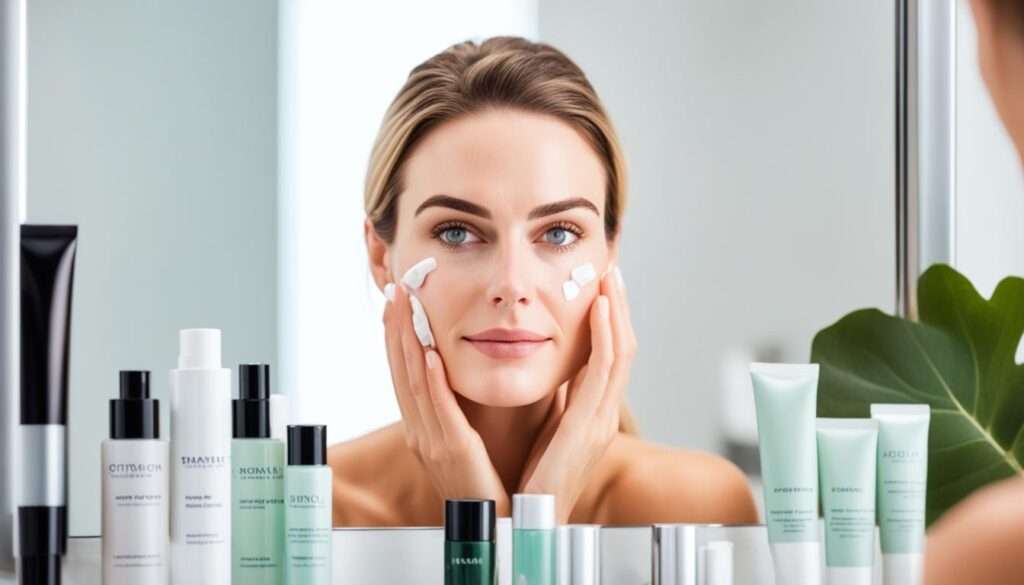
Understanding Retinol’s Anti-inflammatory Effects
Retinol doesn’t just stop at tackling acne causes. It also helps calm acne’s redness and swelling. This means it can make your skin look and feel less irritated.
Adding retinol to your daily skin care can clear up acne. It does this by cleaning out pores, controlling excess oil, fighting off germ causing pimples, and reducing swelling. This makes retinol a surprise ally in the fight against blemishes.
| Retinol Benefits for Acne Prone Skin | Clearing Up Misconceptions | Understanding Retinol’s Anti-inflammatory Effects |
|---|---|---|
| Unclogs pores | Retinol does not exacerbate breakouts | Reduces redness and inflammation |
| Regulates oil production | Retinol does not increase oiliness | Calms and soothes the skin |
| Reduces acne-causing bacteria |
Navigating Retinol Side Effects and How to Mitigate Them
Adding retinol to your skincare can bring great results. But, understanding its side effects is crucial. This guide will help you handle common issues and reduce discomfort.
Minimizing Irritation: Tips for Sensitive Skin Users
People with sensitive skin might find retinol harsh. Here are some tips to lessen the impact:
- Start with a low concentration: Begin with less retinol to let your skin adjust. This step can lower the chance of irritation.
- Limit frequency of use: First, use retinol sparingly. Then, as your skin adapts, you can use it more often.
- Apply a moisturizer: Use a hydrating moisturizer before retinol. It can protect your skin and reduce irritation.
- Choose a milder retinol formulation: Look for retinol products made for sensitive skin. They might have calming ingredients.
By using these simple steps, those with sensitive skin can reap retinol’s benefits. They can do this without the usual irritations.
Adapting Your Skincare Routine for Retinol Use
Taking retinol into your routine asks for some changes. These ensure you get the good without the bad. Here’s what to keep in mind:
- Use retinol at night: Retinol works best in the dark. Make it the last step in your bedtime routine.
- Protect your skin from the sun: It makes your skin sun-sensitive. So, use sunscreen every day to shield against UV rays.
- Avoid combining retinol with other irritating ingredients: Mixing retinol with AHAs or benzoyl peroxide can irritate your skin. If you use them, do it on separate days. Or, talk to a skin expert.
- Listen to your skin: If your skin feels too dry or looks too red, your routine might need a tweak. A dermatologist can help if you’re not sure.
By making these changes, retinol can be a great addition to your skincare. It helps avoid the common problems.
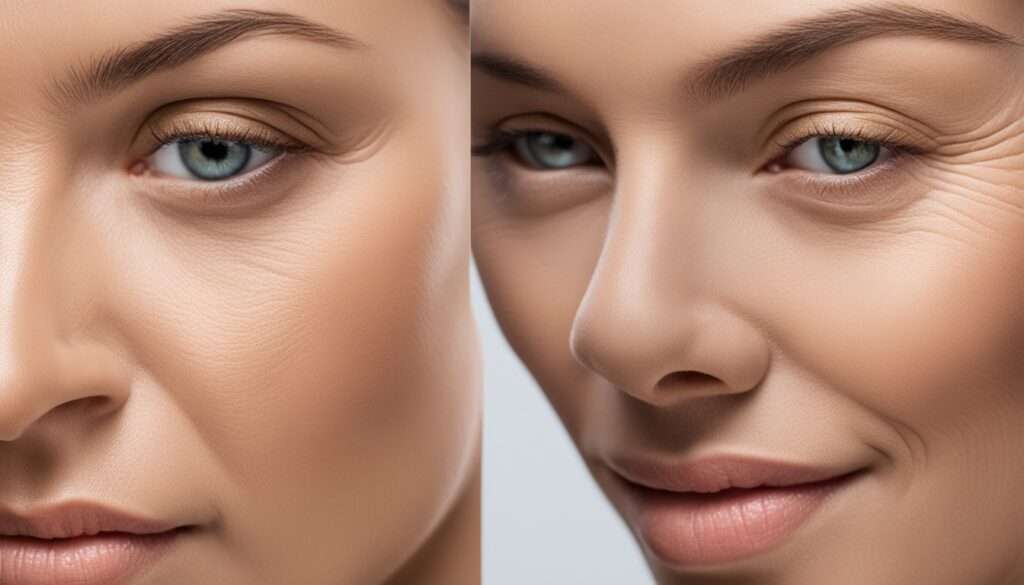
From Dull to Radiant: Retinol Benefits for Skin Texture and Tone
Retinol is a powerhouse ingredient that improves skin texture and tone. It’s great for rough, uneven skin or for those dealing with dark spots. Using retinol can lead to a radiant look.
One benefit of retinol is how it smooths rough skin. It does this by increasing cell turnover. This helps remove dead skin cells and show fresher, smoother skin. So, your skin becomes softer and more refined.
Another upside of using retinol is that it can make your pores look smaller. When it increases cell turnover, retinol can unclog and tighten pores. This makes them less visible. Your complexion ends up looking smoother and more refined, too.
Retinol does a lot for your skin tone, as well. It can lessen hyperpigmentation and dark spots. This makes your skin tone more even and balanced. By reducing excessive melanin and encouraging cell turnover, retinol helps fade discoloration. This creates a more cohesive look.
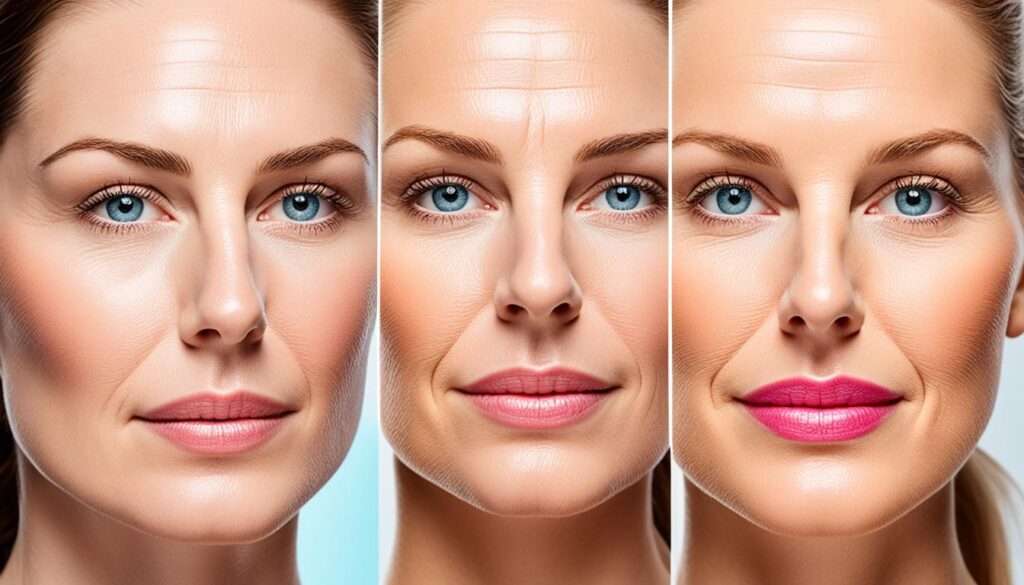
Look at the image below to see the difference retinol makes in skin texture and tone:
As the image shows, retinol really does improve the skin’s look and feel. Using retinol makes your skin smoother and your tone balanced.
Start using retinol in your skincare routine to enjoy these great benefits. You’ll see your skin’s texture get better and your skin tone even out.
A Closer Look at the Best Retinol Products on the Market
There are lots of retinol products on the market, making it hard to choose. I’ll look at some of the top-rated ones here. We’ll check out different types, like creams and serums. We’ll talk about what makes each great.
Many people love retinol creams because of their thick, rich feel. They’re great for dry or older skin. These creams keep your skin deeply hydrated. Plus, they use things like hyaluronic acid to fight off aging signs.
On the other hand, serums are light and soak in quickly. They work well for those with oilier or combo skin. Serums also add things like niacinamide to their mix for extra skin perks. This helps improve the look of your skin, smoothing lines and evening out your tone.
It’s important to pick retinol products based on a few key things. Think about how strong the product is, what it’s made of, and what your skin really needs. Always choose from trusted brands with good reviews. And, make sure the strength matches what your skin is used to.
Learning about the best retinol choices helps you pick well for your skin. Always use them as directed. Start slowly to let your skin adjust and avoid any irritation.
Retinol for Wrinkles: Unveiling Its Profound Impact
Wrinkles and fine lines can worry us all. Yet, retinol is here to help. It’s great at dealing with these signs of aging. Let’s look at how retinol makes such a big difference in reducing wrinkles.
The Science of Retinol and Collagen Production
Understanding how retinol fights wrinkles is key. This ingredient gets our skin to make more collagen. And our skin needs collagen to keep it firm and elastic. With more collagen, those wrinkles and fine lines fade, leaving us with smoother, younger skin.
Real-life Success Stories: Retinol’s Effects on Wrinkles
It’s not just scientists who praise retinol. People share their own stories that show its power. These success tales prove how effective retinol is against wrinkles. And they give hope to anyone looking to improve their skin.
The mix of scientific facts and personal stories about retinol is inspiring. Knowing these can help you confidently add retinol to your skincare routine. This move can really help fight off wrinkles effectively.
Personalizing Your Retinol Experience: Finding the Right Concentration
When it comes to retinol, choosing the right amount is crucial. You should pick a retinol strength that fits your skin perfectly. This way, you get all the good without much of the bad.
At first, go for a milder retinol cream or serum. Then, move up the ladder little by little as your skin gets used to it. Remember, slow and steady wins the race with retinol.
How can you tell what retinol works best for you? Here are some things to think about:
- Figure out your skin type and how it reacts: Think if your skin is oily, dry, or somewhere in between, and if you usually get any bad reactions. This matters when picking the perfect retinol.
- Talk to a skin expert: Not sure what retinol to use? A skincare pro can look at your skin and give you smart advice tailored just for you.
- Start gently: Kick off with a weak retinol, like 0.025% or 0.05%. Your skin will thank you for the slow start.
- Watch your skin’s signals: After you start, keep watch on how your skin looks and feels. Too much dryness or redness means the retinol might be too strong for you. If this happens, you might need to back off.
- Go higher slowly: Once your skin is okay with the retinol, you can think about going a bit stronger. But always keep an eye on how your skin is doing and make changes as needed.
It’s important to remember that what works for someone else might not work for you. Personalizing your retinol journey helps you get the most out of it. This way, retinol can really take your skincare to the next level.
Exploring the Link Between Retinol and Sun Sensitivity
Retinol is great for your skin, but it can also make you more sensitive to the sun. It’s key to know this link. To make retinol work well for you, keep your skin safe from the sun’s damage.
Protective Measures for Retinol Users in the Sun
Using retinol means you need to really focus on protecting your skin from the sun’s harm. Follow these key steps to keep your skin safe:
- Apply broad-spectrum sunscreen with an SPF of 30 or higher to protect your skin from both UVA and UVB rays. Find one that’s good for your skin.
- Reapply sunscreen every two hours, or more often if you sweat or swim.
- Put on protective clothes like hats, long sleeves, and sunglasses to cover your skin and eyes.
- Stay in the shade from 10 a.m. to 4 p.m. when the sun is strongest.
- Use umbrellas or canopies for more protection.
With these steps, you can avoid sunburn and protect your skin while using retinol.
A Seasonal Guide to Retinol Usage
You might change how often you use retinol based on the season. Here’s what to keep in mind:
| Season | Retinol Usage |
|---|---|
| Summer | In summer, with more sun, consider using less retinol. Talk to a skin doctor to plan the best retinol routine for you. |
| Winter | With less sun in winter, you could use retinol more. But, always protect yourself from the sun to avoid damage. |
Everyone reacts differently to retinol and the sun. Stay aware of how your skin feels, and adjust your retinol use with the seasons.
Conclusion
Retinol brings amazing benefits to your skin. It helps make your skin smoother and more youthful. It improves your skin’s texture and tone. Plus, it deals with acne, dark spots, and aging signs.
However, it’s important to make use of retinol the right way. Always start with a small amount. After that, gradually make use of extra as your skin gets made use of to it. Finding the right retinol strength is important for your skin.
Also, be careful with the sun when using retinol. Always use sunscreen and protective clothes. Try to stay out of the sun during its toughest hours. By doing this, your skin will be protected while you enjoy retinol’s benefits.
Stick to these tips to add retinol to your skincare routine. You’ll see amazing changes in your skin. Get ready to glow with youth, thanks to retinol.
FAQ
What are the benefits of using retinol in my skincare routine?
Using retinol makes your skin look younger. It reduces wrinkles, makes skin smoother, and enhances its overall look.
How does retinol transform the skin?
Retinol boosts collagen. This makes skin firmer and smoother. It also makes wrinkles and fine lines less noticeable.
What are the advantages of using retinol in my skincare routine?
Retinol has many pluses. It fights acne, dark spots, and aging signs. Plus, it keeps your skin healthy and young.
How do I properly incorporate retinol into my skincare routine?
Start with low-strength retinol. Slowly use stronger products. Always apply it at night and wear sunscreen during the day. This prevents sun damage. Also, know how to mix retinol with your other skincare items for the best effect.
Can retinol help with acne?
Yes, it can. Retinol clears pores and controls oil. It soothes redness and speeds up skin cell renewal, making it a good anti-acne option.
Are there any side effects of using retinol?
There can be some redness and peeling at first. Yet, you can ease these issues by using retinol gently and just a few times a week.
What are the benefits of retinol for skin texture and tone?
Retinol smooths the skin and shrinks pores. It also fades dark patches, making skin tone more even and bright.
What are some of the best retinol products on the market?
Look for quality retinol creams and serums. They come in different strengths to handle various skin issues.
How does retinol impact wrinkles?
It boosts collagen, which plumps up skin, lessening wrinkles. Using retinol gives you smoother, younger-looking skin.
How do I find the right concentration of retinol for my skincare needs?
Start with the lowest retinol level. Then, work up to stronger ones as your skin gets used to it. If you’re not sure, a skin professional can help.
Should I be concerned about sun exposure while using retinol?
Yes, because retinol makes your skin more sensitive to the sun. So, always protect yourself with sunscreen, clothes, and by keeping away from direct sun in the middle of the day.
